Features
Biden-Harris Inauguration Ceremonies and Poets of Democracy
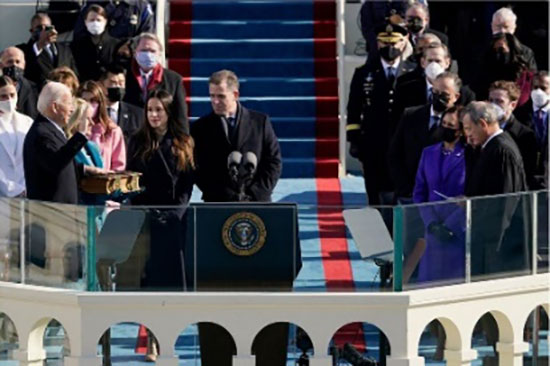
by Rajan Philips
Joe Biden and Kamala Harris took their oaths as President and Vice President last Wednesday, January 20. It was a peaceful transition of power in America, as it has been every four years for over 200 years. The difference this year was that the transition took place in a highly fortified capital, in a socially distanced and politically divided country. Modifying Bill Clinton’s old line, the new President said in his inaugural speech: “We’ll lead not merely by the example of our power, but 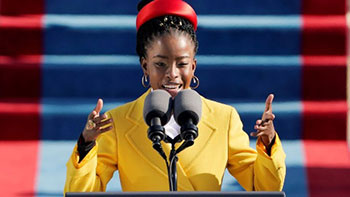 by the power of our example.” The example was there in the peaceful transition of the nation’s political power, except this time it needed the deployment of the state’s coercive power to keep it peaceful. It was a swift turnaround after Trump’s failed self-coup (auto-golpe, as in original Spanish) two weeks ago. But the shadow hung heavy over Washington. Biden’s inaugural poet, the 22-year-old Amanda Gorman, captured the moment, asking “Where can we find light / In this never-ending shade?”
by the power of our example.” The example was there in the peaceful transition of the nation’s political power, except this time it needed the deployment of the state’s coercive power to keep it peaceful. It was a swift turnaround after Trump’s failed self-coup (auto-golpe, as in original Spanish) two weeks ago. But the shadow hung heavy over Washington. Biden’s inaugural poet, the 22-year-old Amanda Gorman, captured the moment, asking “Where can we find light / In this never-ending shade?”
The big, fat fly in the inauguration ointment was of course Donald Trump, who lost the election in November but could never get over it. He did not show up at his successor’s inauguration. Instead, he flew away to Florida, after the parody of a farewell ceremony attended by an estimated crowd of 200 people comprising family and residual staffers, to the blaring of Frank Sinatra’s “My Way”, not to mention the 21-gun salute that he craved and was given. Even Trump’s Vice President, Mike Pence, kept away from this farce, and attended Biden’s inauguration as the sole representative of the old regime. And historians, even before history, have already ranked Trump, the only President to be impeached twice, as America’s worst president ever.
Inauguration ceremonies
American presidential inaugurations are full of pomp and ceremonies. Historically, they may have evolved from early republican adaptations of monarchical rituals of the Empire that America broke free from. Not unlike the design of the capital City of Washington modelled on the classical architecture of Rome, the ancient First Republic, that also had Senators. George Washington and Thomas Jefferson were both promoters of the adaptations of classical architecture, a style that persisted till the 1930s. President Washington’s most important legacy, however, is considered to be his walking away from office after two terms, in 1797, and creating the precedent for peaceful transition of power in a modern republic. George III, the bipolar English King at that time, was apparently stunned by the retirement from power by his American nemesis. Donald Trump has been the only President ever to try to break from the precedent set by the country’s founding President.
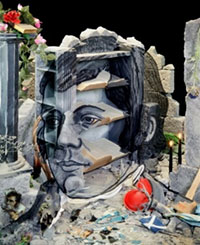 The first post-Trump inauguration had its special moments and meanings. Diversity and pluralism were writ large over it. It was a historic occasion for America to have a woman, a woman of colour, and the first descendant of immigrant parents from Jamaica and Tamil Nadu, become the country’s second in command. Swearing in Kamala Harris was Justice Sonia Sotomayor, the first Latina to serve on the Supreme Court. Joe Biden is the second Catholic to become President, sixty years after President Kennedy. Administering the presidential oath was Chief Justice John Roberts, the first Catholic Chief Justice. Sixty years ago, such a concurrence would have been called Catholic Action. Not anymore. Joe Biden, a devout and practicing Catholic, is to the left of the American Catholic establishment, the very mobile and socially conservative Catholic middle classes.
The first post-Trump inauguration had its special moments and meanings. Diversity and pluralism were writ large over it. It was a historic occasion for America to have a woman, a woman of colour, and the first descendant of immigrant parents from Jamaica and Tamil Nadu, become the country’s second in command. Swearing in Kamala Harris was Justice Sonia Sotomayor, the first Latina to serve on the Supreme Court. Joe Biden is the second Catholic to become President, sixty years after President Kennedy. Administering the presidential oath was Chief Justice John Roberts, the first Catholic Chief Justice. Sixty years ago, such a concurrence would have been called Catholic Action. Not anymore. Joe Biden, a devout and practicing Catholic, is to the left of the American Catholic establishment, the very mobile and socially conservative Catholic middle classes.
Post-Trump, Biden’s twin inaugural themes were unity and democracy. He did not soar like Obama, that was left to Lady Gaga and her rendition of the National Anthem. But Biden exuded strength and sincerity. Just as Abraham Lincoln had said in 1863 that his “whole soul” was in the proclamation of emancipation from slavery, President Biden promised: “My whole soul is in this: bringing America together.” There is no underestimating the challenges that this task faces, especially while grappling with the four daunting challenges he listed: the pandemic, climate, racial justice, and the economy.
And the theme of democracy is tied up with all of them, and not rarefied from any of them. He did not say much on foreign policy except for acknowledging that “the world is watching,” and asserting that “America has been tested, and we have come out stronger for it.” The world will indeed be watching. But the world saw that the American promise for democracy is still alive where it should generationally be – in Amanda Gorman’s stirring recitation of her inauguration poem, “The Hill we climb.”
Poets of Democracy
Tomorrow, January 25, is Robbie Burns day, a day mostly marked in many parts of the world by Scots and their friends, in consuming haggis, drinking Scotch, and piping bagpipes. But there is a serious side to the Scottish icon and his poetry, for Burns has been called, “the master poet of democracy,” and that he was made to be so by “the ordeal of poverty and toil,” and not by some bourgeois attributes or sensibilities.
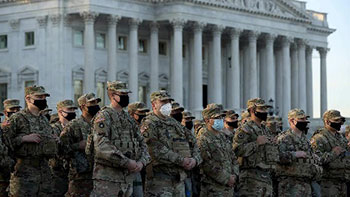 Burns’s “sympathy for the oppressed and support for revolution” made him a passionate champion of American Independence and the French Revolution. He went further in his 1792 poem: The Rights of Woman, surpassing both Thomas Paine (Rights of Man), and the great Thomas Jefferson (Declaration of Independence), showing poetic prescience in proclaiming:
Burns’s “sympathy for the oppressed and support for revolution” made him a passionate champion of American Independence and the French Revolution. He went further in his 1792 poem: The Rights of Woman, surpassing both Thomas Paine (Rights of Man), and the great Thomas Jefferson (Declaration of Independence), showing poetic prescience in proclaiming:
“While Europe’s eye is fix’d on mighty things, The fate of Empires and the fall of Kings; While quacks of State must each produce his plan, And even children lisp the Rights of Man; Amid this mighty fuss just let me mention, The Rights of Woman merit some attention.”
That same year, 1792, Burns wrote another poem: “The Slave’s Lament”, based on his work experience in Jamaica. That and other poems of Burns inspired and were frequently cited by both Fredrick Douglas, the celebrated African American abolitionist, and Abraham Lincoln, the President of emancipation.
It is indeed a poetic coincidence that more than 200 years after Burns, a young African American female poet should articulate the same themes of democracy and egalitarianism that inspired Burns in wholly different circumstances in far away Scotland. Stepping into a tradition of reading poetry at presidential inaugurations that President Kennedy had started in 1961 by inviting Robert Frost, no less, Amanda Gorman positively stole a good part of the inauguration thunder with her poise, panache and, of course, her poetry.
A Harvard graduate and the country’s first National Youth Poet Laureate, Ms. Gorman had been invited by President Biden on the suggestion of his wife, Dr. Jill Biden, who is an educator. As she later said, Ms. Gorman wrote the poem in two halves, the first before the January 6 siege of the Capitol, and the second after the siege. “That day gave me a second wave of energy to finish the poem,” she has told the media. Poetic admirers have called the poem’s title, “The Hill We Climb,” as 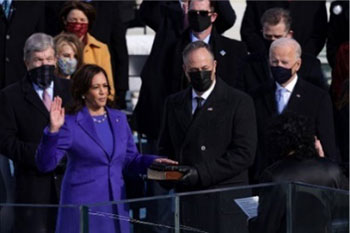 suggesting “both labour and transcendence.” The poem was aspirational in the first half, and defiant in the second:
suggesting “both labour and transcendence.” The poem was aspirational in the first half, and defiant in the second:
We the successors of a country and a time,
Where a skinny Black girl,
descended from slaves and raised by a single mother,
can dream of becoming president,
only to find herself reciting for one.
We’ve seen a force that would shatter –
our nation rather than share it,
Would destroy our country if it meant delaying democracy.
And this effort very nearly succeeded.
But while democracy can be periodically delayed,
it can never be permanently defeated.
- News Advertiesment
See Kapruka’s top selling online shopping categories such as Toys, Grocery, Flowers, Birthday Cakes, Fruits, Chocolates, Clothing and Electronics. Also see Kapruka’s unique online services such as Money Remittence,News, Courier/Delivery, Food Delivery and over 700 top brands. Also get products from Amazon & Ebay via Kapruka Gloabal Shop into Sri Lanka.
Features
Islamophobia and the threat to democratic development

There’s an ill more dangerous and pervasive than the Coronavirus that’s currently sweeping Sri Lanka. That is the fear to express one’s convictions. Across the public sector of the country in particular many persons holding high office are stringently regulating and controlling the voices of their consciences and this bodes ill for all and the country.
The corrupting impact of fear was discussed in this column a couple of weeks ago when dealing with the military coup in Myanmar. It stands to the enduring credit of ousted Myanmarese Head of Government Aung San Suu Kyi that she, perhaps for the first time in the history of modern political thought, singled out fear, and not power, as the principal cause of corruption within the individual; powerful or otherwise.
To be sure, power corrupts but the corrupting impact of fear is graver and more devastating. For instance, the fear in a person holding ministerial office or in a senior public sector official, that he would lose position and power as a result of speaking out his convictions and sincere beliefs on matters of the first importance, would lead to a country’s ills going unaddressed and uncorrected.
Besides, the individual concerned would be devaluing himself in the eyes of all irrevocably and revealing himself to be a person who would be willing to compromise his moral integrity for petty worldly gain or a ‘mess of pottage’. This happens all the while in Lankan public life. Some of those who have wielded and are wielding immense power in Sri Lanka leave very much to be desired from these standards.
It could be said that fear has prevented Sri Lanka from growing in every vital respect over the decades and has earned for itself the notoriety of being a directionless country.
 All these ills and more are contained in the current controversy in Sri Lanka over the disposal of the bodies of Covid victims, for example. The Sri Lankan polity has no choice but to abide by scientific advice on this question. Since authorities of the standing of even the WHO have declared that the burial of the bodies of those dying of Covid could not prove to be injurious to the wider public, the Sri Lankan health authorities could go ahead and sanction the burying of the bodies concerned. What’s preventing the local authorities from taking this course since they claim to be on the side of science? Who or what are they fearing? This is the issue that’s crying out to be probed and answered.
All these ills and more are contained in the current controversy in Sri Lanka over the disposal of the bodies of Covid victims, for example. The Sri Lankan polity has no choice but to abide by scientific advice on this question. Since authorities of the standing of even the WHO have declared that the burial of the bodies of those dying of Covid could not prove to be injurious to the wider public, the Sri Lankan health authorities could go ahead and sanction the burying of the bodies concerned. What’s preventing the local authorities from taking this course since they claim to be on the side of science? Who or what are they fearing? This is the issue that’s crying out to be probed and answered.
Considering the need for absolute truthfulness and honesty on the part of all relevant persons and quarters in matters such as these, the latter have no choice but to resign from their positions if they are prevented from following the dictates of their consciences. If they are firmly convinced that burials could bring no harm, they are obliged to take up the position that burials should be allowed.
If any ‘higher authority’ is preventing them from allowing burials, our ministers and officials are conscience-bound to renounce their positions in protest, rather than behave compromisingly and engage in ‘double think’ and ‘double talk’. By adopting the latter course they are helping none but keeping the country in a state of chronic uncertainty, which is a handy recipe for social instabiliy and division.
In the Sri Lankan context, the failure on the part of the quarters that matter to follow scientific advice on the burials question could result in the aggravation of Islamophobia, or hatred of the practitioners of Islam, in the country. Sri Lanka could do without this latter phobia and hatred on account of its implications for national stability and development. The 30 year war against separatist forces was all about the prevention by military means of ‘nation-breaking’. The disastrous results for Sri Lanka from this war are continuing to weigh it down and are part of the international offensive against Sri Lanka in the UNHCR.
However, Islamophobia is an almost world wide phenomenon. It was greatly strengthened during Donald Trump’s presidential tenure in the US. While in office Trump resorted to the divisive ruling strategy of quite a few populist authoritarian rulers of the South. Essentially, the manoeuvre is to divide and rule by pandering to the racial prejudices of majority communities.
It has happened continually in Sri Lanka. In the initial post-independence years and for several decades after, it was a case of some populist politicians of the South whipping-up anti-Tamil sentiments. Some Tamil politicians did likewise in respect of the majority community. No doubt, both such quarters have done Sri Lanka immeasurable harm. By failing to follow scientific advice on the burial question and by not doing what is right, Sri Lanka’s current authorities are opening themselves to the charge that they are pandering to religious extremists among the majority community.
The murderous, destructive course of action adopted by some extremist sections among Muslim communities world wide, including of course Sri Lanka, has not earned the condemnation it deserves from moderate Muslims who make-up the preponderant majority in the Muslim community. It is up to moderate opinion in the latter collectivity to come out more strongly and persuasively against religious extremists in their midst. It will prove to have a cementing and unifying impact among communities.
It is not sufficiently appreciated by governments in the global South in particular that by voicing for religious and racial unity and by working consistently towards it, they would be strengthening democratic development, which is an essential condition for a country’s growth in all senses.
A ‘divided house’ is doomed to fall; this is the lesson of history. ‘National security’ cannot be had without human security and peaceful living among communities is central to the latter. There cannot be any ‘double talk’ or ‘politically correct’ opinions on this question. Truth and falsehood are the only valid categories of thought and speech.
Those in authority everywhere claiming to be democratic need to adopt a scientific outlook on this issue as well. Studies conducted on plural societies in South Asia, for example, reveal that the promotion of friendly, cordial ties among communities invariably brings about healing among estranged groups and produces social peace. This is the truth that is waiting to be acted upon.
Features
Pakistan’s love of Sri Lanka

By Sanjeewa Jayaweera
It was on 3rd January 1972 that our family arrived in Karachi from Moscow. Our departure from Moscow had been delayed for a few weeks due to the military confrontation between Pakistan and India. It ended on 16th December 1971. After that, international flights were not permitted for some time.
The contrast between Moscow and Karachi was unbelievable. First and foremost, Moscow’s temperature was near minus 40 degrees centigrade, while in Karachi, it was sunny and a warm 28 degrees centigrade. However, what struck us most was the extreme warmth with which the airport authorities greeted our family. As my father was a diplomat, we were quickly ushered to the airport’s VIP Lounge. We were in transit on our way to Rawalpindi, the airport serving the capital of Islamabad.
We quickly realized that the word “we are from Sri Lanka” opened all doors just as saying “open sesame” gained entry to Aladdin’s cave! The broad smile, extreme courtesy, and genuine warmth we received from the Pakistani people were unbelievable.
This was all to do with Mrs Sirima Bandaranaike’s decision to allow Pakistani aircraft to land in Colombo to refuel on the way to Dhaka in East Pakistan during the military confrontation between Pakistan and India. It was a brave decision by Mrs Bandaranaike (Mrs B), and the successive governments and Sri Lanka people are still enjoying the fruits of it. Pakistan has been a steadfast and loyal supporter of our country. They have come to our assistance time and again in times of great need when many have turned their back on us. They have indeed been an “all-weather” friend of our country.
Getting back to 1972, I was an early beneficiary of Pakistani people’s love for Sri Lankans. I failed the entrance exam to gain entry to the only English medium school in Islamabad! However, when I met the Principal, along with my father, he said, “Sanjeewa, although you failed the entrance exam, I will this time make an exception as Sri Lankans are our dear friends.” After that, the joke around the family dinner table was that I owed my education in Pakistan to Mrs B!
At school, my brother and I were extended a warm welcome and always greeted “our good friends from Sri Lanka.” I felt when playing cricket for our college; our runs were cheered more loudly than of others.
One particular incident that I remember well was when the Embassy received a telex from the Foreign inistry. It requested that our High Commissioner seek an immediate meeting with the Prime Minister of Pakistan, Mr Zulifikar Ali Bhutto (ZB), and convey a message from Mrs B. The message requested that an urgent shipment of rice be dispatched to Sri Lanka as there would be an imminent rice shortage. As the Ambassador was not in the station, the responsibility devolved on my father.
It usually takes about a week or more to get an audience with the Prime Minister (PM) of a foreign country due to their busy schedule. However, given the urgency, my father spoke to the Foreign Ministry’s Permanent Sectary, who fortunately was our neighbour and sought an urgent appointment. My father received a call from the PM’s secretary around 10 P.M asking him to come over to the PM’s residence. My father met ZB around midnight. ZB was about to retire to bed and, as such, was in his pyjamas and gown enjoying a cigar! He had greeted my father and had asked, “Mr Jayaweera, what can we do for great friend Madam Bandaranaike?. My father conveyed the message from Colombo and quietly mentioned that there would be riots in the country if there is no rice!
ZB had immediately got the Food Commissioner of Pakistan on the line and said, “I want a shipload of rice to be in Colombo within the next 72 hours!” The Food Commissioner reverted within a few minutes, saying that nothing was available and the last export shipment had left the port only a few hours ago to another country. ZB had instructed to turn the ship around and send it to Colombo. This despite protests from the Food Commissioner about terms and conditions of the Letter of Credit prohibiting non-delivery. Sri Lanka got its delivery of rice!
The next was the visit of Mrs B to Pakistan. On arrival in Rawalpindi airport, she was given a hero’s welcome, which Pakistan had previously only offered to President Gaddafi of Libya, who financially backed Pakistan with his oil money. That day, I missed school and accompanied my parents to the airport. On our way, we witnessed thousands of people had gathered by the roadside to welcome Mrs B.
When we walked to the airport’s tarmac, thousands of people were standing in temporary stands waving Sri Lanka and Pakistan flags and chanting “Sri Lanka Pakistan Zindabad.” The noise emanating from the crowd was as loud and passionate as the cheering that the Pakistani cricket team received during a test match. It was electric!
I believe she was only the second head of state given the privilege of addressing both assemblies of Parliament. The other being Gaddafi. There was genuine affection from Mrs B amongst the people of Pakistan.
I always remember the indefatigable efforts of Mr Abdul Haffez Kardar, a cabinet minister and the President of the Pakistan Cricket Board. From around 1973 onwards, he passionately championed Sri Lanka’s cause to be admitted as a full member of the International Cricket Council (ICC) and granted test status. Every year, he would propose at the ICC’s annual meeting, but England and Australia’s veto kept us out until 1981.
I always felt that our Cricket Board made a mistake by not inviting Pakistan to play our inaugural test match. We should have appreciated Mr Kardar and Pakistan’s efforts. In 1974 the Pakistan board invited our team for a tour involving three test matches and a few first-class games. Most of those who played in our first test match was part of that tour, and no doubt gained significant exposure playing against a highly talented Pakistani team.
Several Pakistani greats were part of the Pakistan and India team that played a match soon after the Central Bank bomb in Colombo to prove that it was safe to play cricket in Colombo. It was a magnificent gesture by both Pakistan and India. Our greatest cricket triumph was in Pakistan when we won the World Cup in 1996. I am sure the players and those who watched the match on TV will remember the passionate support our team received that night from the Pakistani crowd. It was like playing at home!
I also recall reading about how the Pakistani government air freighted several Multi Barrell artillery guns and ammunition to Sri Lanka when the A rmy camp in Jaffna was under severe threat from the LTTE. This was even more important than the shipload of rice that ZB sent. This was crucial as most other countries refused to sell arms to our country during the war.
Time and again, Pakistan has steadfastly supported our country’s cause at the UNHCR. No doubt this year, too, their diplomats will work tirelessly to assist our country.
We extend a warm welcome to Mr Imran Khan, the Prime Minister of Pakistan. He is a truly inspirational individual who was undoubtedly an excellent cricketer. Since retirement from cricket, he has decided to get involved in politics, and after several years of patiently building up his support base, he won the last parliamentary elections. I hope that just as much as he galvanized Sri Lankan cricketers, his political journey would act as a catalyst for people like Kumar Sangakkara and Mahela Jayawardene to get involved in politics. Cricket has been called a “gentleman’s game.” Whilst politics is far from it!.
Features
Covid-19 health rules disregarded at entertainment venues?

Believe me, seeing certain videos, on social media, depicting action, on the dance floor, at some of these entertainment venues, got me wondering whether this Coronavirus pandemic is REAL!
To those having a good time, at these particular venues, and, I guess, the management, as well, what the world is experiencing now doesn’t seem to be their concerned.
Obviously, such irresponsible behaviour could create more problems for those who are battling to halt the spread of Covid-19, and the new viriant of Covid, in our part of the world.
The videos, on display, on social media, show certain venues, packed to capacity – with hardly anyone wearing a mask, and social distancing…only a dream..
How can one think of social distancing while gyrating, on a dance floor, that is over crowded!
If this trend continues, it wouldn’t be a surprise if Coronavirus makes its presence felt…at such venues.
And, then, what happens to the entertainment scene, and those involved in this field, especially the musicians? No work, whatsoever!
Lots of countries have closed nightclubs, and venues, where people gather, in order to curtail the spread of this deadly virus that has already claimed the lives of thousands.
Thailand did it and the country is still having lots of restrictions, where entertainment is concerned, and that is probably the reason why Thailand has been able to control the spread of the Coronavirus.
With a population of over 69 million, they have had (so far), a little over 25,000 cases, and 83 deaths, while we, with a population of around 21 million, have over 80,000 cases, and more than 450 deaths.
I’m not saying we should do away with entertainment – totally – but we need to follow a format, connected with the ‘new normal,’ where masks and social distancing are mandatory requirements at these venues. And, dancing, I believe, should be banned, at least temporarily, as one can’t maintain the required social distance, while on the dance floor, especially after drinks.
Police spokesman DIG Ajith Rohana keeps emphasising, on TV, radio, and in the newspapers, the need to adhere to the health regulations, now in force, and that those who fail to do so would be penalised.
He has also stated that plainclothes officers would move around to apprehend such offenders.
Perhaps, he should instruct his officers to pay surprise visits to some of these entertainment venues.
He would certainly have more than a bus load of offenders to be whisked off for PCR/Rapid Antigen tests!
I need to quote what Dr. H.T. Wickremasinghe said in his article, published in The Island of Tuesday, February 16th, 2021:
“…let me conclude, while emphasising the need to continue our general public health measures, such as wearing masks, social distancing, and avoiding crowded gatherings, to reduce the risk of contact with an infected person.
“There is no science to beat common sense.”
But…do some of our folks have this thing called COMMON SENSE!










